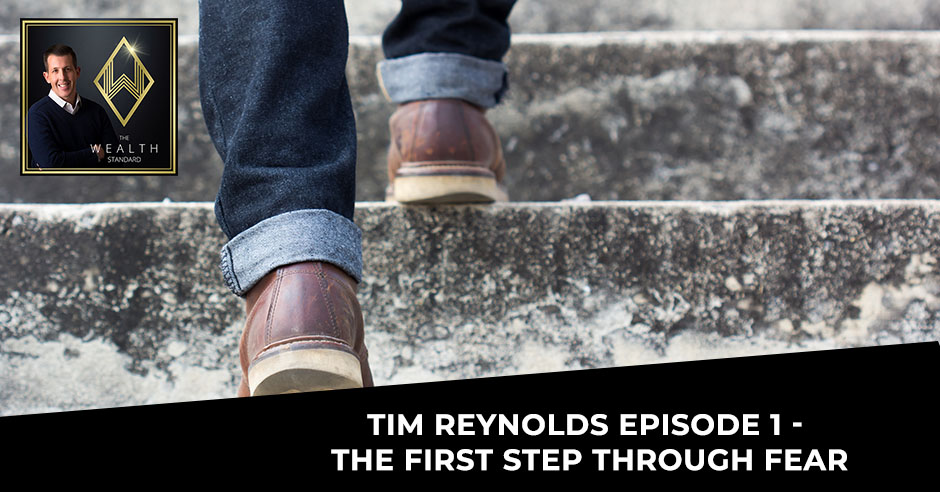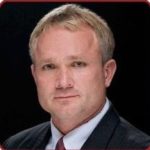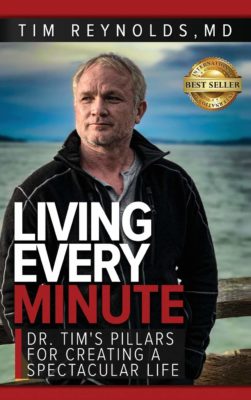
Podcast: Play in new window | Download

Life is fragile, and you only have one chance. It’s about time that you change your life and take some risks. Always ask yourself, what’s the worst thing that can happen? Tim Reynolds asked himself that same question, and he is now the founder of Living Every Minute. Learn Tim’s story on how he started his business and how he accepts some of his shortcomings. Learn how to change the rules of the game as Tim joins your host Patrick Donohoe. Also, learn more about his book, Living Every Minute, today.
—
Watch the episode here:
Listen to the podcast here:
Change Your Life: First, Change Your Rules With Tim Reynolds, M.D.
The following five episodes are with businessman, investor, doctor and now, author, Tim Reynolds. The interview was in-person in my office. If you’re reading the episodes, go head over to TheWealthStandard.com and it’ll have a link there. Make sure you check that out. A little bit about Tim. Tim is a former Green Beret in the Special Forces. He was a medic and also a Battalion Surgeon. He graduated from Texas A&M with his Medical degree and his specialization was Emergency Medicine. He was an emergency room doctor for several years and then also co-started a company called HealthCARE Express. He has, I believe, 15 or 16 locations throughout Texas, Oklahoma, Arkansas and Louisiana. He has his book. You can check it out on Amazon. It’s called Living Every Minute. It’s also on Audible. He reads the audible audiobook. Tim is an amazing guy. He’s one of the first original Platinum partners with Tony Robbins. He has a love and zest for life. It’s throughout his book.
It’s going to be throughout this interview. You can imagine that in the roles that he’s played, he has experienced firsthand the fragility of life. He’s going to share some of those experiences throughout these five segments. I want to forewarn you, this is a PG-13-ish interview. There’s some colorful language and some relatively graphic stories that Tim tells. You are going to experience him, his heart, his passion for life. You can check his website out. It’s LivingEveryMinute.com. He has some personal development programs, courses and a lot of other resources that you will want to check out. Go head over there. Without further delay, let’s start episode one with my dear friend, Tim Reynolds.
—
Whether it’s this experience writing a book or where people are held back by fear, first, what are maybe some stories of you confronting your fears and overcoming them? Are there some principles that you’ve found where people can follow and get through their fear?
I had an emergency medicine contract, I contracted with the hospital to run their emergency department. My business was I hired the doctors, paid the malpractice, build the patients, did all that stuff for the hospital. The doctors work in the ER. They don’t usually work for the hospital. They do in some cases but in many cases, the hospital outsources that to an ER company and the doctors. I owned that company. When I had the experience, I’ve been there for ten years. We’ve been doing this for many years. I get called in the office and they say, “We’re putting your contract out for bids.” I had been in the office maybe three months before. I said, “I’m about to put roots down about to buy a ranch.”
“I want to make sure we’re good.” “We’re good.” Ninety days later, he calls me in the offices and says they are putting the contract out for bids, which they had not done in ten years. I knew what that meant. “What did we do wrong?” “Nothing. You guys are great. We want to see if we can get it cheaper.” “I know you can get it cheaper but you aren’t getting the quality of now.” There’s that whole conversation.
We had been thinking about building the business we have now, HealthCARE Express. I walked out of that office and it felt like somebody hit me in the stomach with a baseball bat, partly because financial, partly because it became who I was. I was the Medical Director for a Level II Trauma Center. That was part of my personality. I had mixed up my career with who I was as a human.
When you start a business with no money, the fear of losing the money gets taken away from you. Click To Tweet
I was scared to death. I didn’t know what we were going to do. I didn’t know how I was going to feed my family. That was the first time that ever happened. I had two choices, go get another job because I could do that I was a Medical Director for ten years or go out on her own and try and do this ourselves. That was a big step. You’re leaving a multi-six-figure career to zero and it was zero for a good year. That was a big fear.
You have the fear where you’re losing this contract and then you decide to go completely the other direction. You took a set of fears and then you pile it on top of the other.
It was weird, too. It was like life happens for you because I don’t know if I would have had the guts to do it, had that not happened. It had been crossing my mind but the thing that had kept me there was the money. It was too good to walk away from. When there was no money, for some reason, the fear of losing the money got taken from me so I didn’t have that fear anymore. Money was already gone now. It wasn’t that I couldn’t go get it again but I was at the crossroads and I thought, “What if we go build our own thing?” Finally, the fear was, I thought, “What’s the worst thing that could happen?”
The worst thing that could happen is a question that people need to ask themselves. The worst thing that can happen is where we’re at now. Why don’t we go try and build this thing, work our asses off for a few years? If it doesn’t work out, we’re just right here. I’ll often do that and say, number one, “What’s the worst thing that could happen? Is it worth that risk?” Number two, “What’s the best thing that could happen? Is it worth that time and effort?”
If you’re going to build a business and the best thing that can happen is you’re going to make $5,000 a month, it’s probably not worth the effort. It’s not a huge risk but for me, there needs to also be a reward because I’m going to spend my time, money and brain damage trying to make it successful. One of the things that help me is to say, “Honestly, what’s the worst thing that could happen?” I bet I’ll go back finally to my old Special Forces days, we used to have a saying, “If this doesn’t kill us, it’s going to make a great story.” We’ve been in some shit where you’re like, “This might be the last day but if it doesn’t kill us, what a great story this is going to be.”

That adds sometimes to where you’re able to understand, worst-case scenario. You found that when a person is afraid of something, they have difficulty confronting that and asking that simple question like, “I’m afraid. What’s the worst that can happen? This could happen then this is going to happen and it’s going to happen.” “Why is that? Why are you afraid of that?” “I’m afraid because of this.” It’s not a very difficult exercise but a lot of people don’t tend to go there.
If you can help them and say to them, “Literally, what’s the worst possible case scenario that could come from this and this? Could you accept that? Could you live through that? What would you do if that happened?” “I would do ABC.” That’s the worst thing that could happen. What are you afraid of? Jump. People don’t do that analysis themselves. Another thing that happens that I help people with a lot is we don’t think logically at 2:00 in the morning but people get in their fears at 2:00 in the morning because you wake up and your brain goes circle, think about a million things.
Turn on the light, get your journal and write all those millions of things down. Those millions of things are four things, you just can’t stop circling. If you’ll take and write those down, you’ll get to a page and go, “That’s what was keeping me awake.” You can shut the journal. You’re like, “I didn’t read that somewhere. That’s what I had to do,” because we all get in that circle. The brain goes running around.
How has your hunger evolved? I assume hunger comes from what we talked about. You obviously have fears, you’re going to unpack fears but then when you understand, “What’s a level ten success look like, getting excited and inspired by that? Does hunger come from more than that? Is that where the source is?
For me, hunger comes from having this desire. I don’t know if I was born with this if I can teach this to other people but some people have more of it than others. You can certainly learn more. We listened to a lot of the same stuff, mentors and you can learn some tools and skills along the way but what made you listen to those in the beginning? What made you start? Somebody was born with this hunger for the better. I always wanted to create something spectacular. That’s why it’s called create spectacular.
If something doesn't kill you, it will at least make a good story. Click To Tweet
How do I create a spectacular life? If my life is a clay image that I’m creating and I’m putting new clay on every day, I’m scraping some off what I’ve done, the sculpture that’s done was my life, I want that to look spectacular. I want it to be awesome. I want to be able to say in the last second before I die, if I had one last thought I want to go, “That was awesome. That was a good life. That was a life worth living.” It should be a tough one.
It’s that trade-off. You always have yin and yang. Nothing comes without price and contrast. Especially with animals or relationships, there’s so much beauty about it but we understand that life is fragile. Things are going to happen. People are going to move.
Everything has a price. You said it right. Being healthy has a price you got to pay so as being sick. Having a great marriage, there’s a price to pay so as to divorce and it’s an expensive one. Being wealthy has a price. You have to work hard. To be poor also has a price.
I’m not sure where I learned this from but I look at marriage as a horrible way of looking at it. To me, it works where it’s a bank account where you could build up a massive amount of money in that bank account, say one thing and it’s all wrong. The same thing goes with business, with your health. You’re making an investment. You’re saving, putting things aside. Your passion is to eat chocolate or ice cream. You’re putting that aside but you’re building up your whole thing. We were talking about Jesse Itzler and Tony Robbins is the same thing.
They eat super healthy, strict and then their significant other is eating cheesecake or chocolate. This was one of those things where you could pay that price if you built up enough capital in that bank account. In businesses, it’s the same thing. Your team is like, “Kudos, rewards. You guys are amazing,” then you can be critical. It’s a high-interest debt.

Change Your Life: The hardest thing about business is when you thought somebody was going to go with you and they don’t. They have their life, and maybe they’re not on the same road as you anymore.
The toughest thing in business, I heard Dave Ramsey say this. When he said it, I was like, “I wish I’d thought of that.” He said, “What’s the hardest thing about being a business owner? The hardest thing is when you thought somebody was going to go with you and they don’t. Get on the train. What do you mean you’re not coming? I thought you were going to the end. I thought we were together.” It happens to all of us. If you do it long enough, they have their life and you thought that they were on the same road and when they’re not or when you find out even worse, they betrayed you. I’ve had that happen. They stole from you or betrayed you. It’s not about the money. It’s about what happens when somebody steals from you, what that means. That’s the hardest thing in business because I thought we were like this and they’re gone.
That’s another thing too with reputation and trust, you can spend years building. I can’t remember who said it, it’s gone in five minutes.
It takes a moment to ruin it. We’ve seen it and our society loves it. Our society hates a hero because there’s a hero, somebody who’s done great, they look at almost anything to find their fault. If you dig deep enough, we all have faults. We’re human.
What you see on the surface especially whether it’s social media or the news, there are so many surfaces out there but everybody has their demons, shortcomings and insecurity. It exists in everybody. It’s that compliment. You have two sides to it. That’s the price of it. It exists at all levels.
That’s part of the problem with social media is our way of social media life and it has a real life. It’s one of the things I love about Itzler’s wife so much. She doesn’t care. The question is, is she a billionaire so now she can do that or she becomes a billionaire because she’s just that way?
It’s one of those things where you oftentimes have an image to get something. You want to put yourself out there and portray yourself as something because you want something. When you realize that all you want is a good relationship with yourself, with God and with your spouse, you don’t need anything else so you’re able to be more real.
When you’re asking about the hunger part, what’s happened is the hunger’s matured over the years is I’m still plenty hungry. I can be pretty dang happy with exactly the way things are now. Nothing changed. I’m pretty happy. One of the difficulties we’ve had with the book and with Living Every Minute, the company, the concept is I don’t have a desire to be famous. I don’t want to go do 50 keynote speeches. I want to spend time with my wife and my family on the ranch and things. It’s a dichotomy of, “I want to get the word out and make sure people know about it because it’s life-changing and has helped a lot of people but at the same time,” I have no need for fame.
Don't just work in your life; work on your life. Click To Tweet
That’s a dichotomy that I’ve run into. I remember when we were talking about Will. We have a course called Gladiator. He’s read the book. He comes to Gladiator. He had a heart attack. He’s a great guy, a great person. As he starts to get better with himself and starts thinking about, “This is the only time I have to create spectacular with my family and my life,” he goes home. Maybe more than anybody else has come through the course. He went home and literally did housekeeping. He said, “Here’s my help. These are all the things I’m going to do. Here’s my relationship with my wife. Here’s the relationship with my kids.”
He literally made this like a workbook. We have a workbook that goes with it. He took a year and went through every chapter for a year. At the end of the year, he’s transformed his whole life. He had a great job but now he also has a side business and he took the leap of faith. He didn’t know if he could do it but he did. Now he’s got the side hustle that he does and he’s super proud of that. Seeing somebody transform their life like that, that’s the whole reward.
Usually, it’s a moment of decision where destiny is shaped. It’s that realization. When you have examples of experiences, you’ve had a ton of them being an emergency room MD where you see the fragileness of mortality and you realize, “This is all that I have. All I have is now. We work on some things to have a better experience.”
This is all we have. As far as I know, this is not a dress rehearsal. This is life. We got to make the most of it we can so it will be spectacular. We can say, “This is it. This is amazing.” What most people do is they live the zombie life that I talk about. They get up in the morning, “Twenty minutes to get to work, get my coffee down, get in the car, drive the exact same way I always drive, check-in my brain at this clock, go in, do the work that I have to do. Check out, go home, turn on the TV, pop a cold one, fall asleep in the chair, go to bed.” Every day is Tuesday. Every day starts to look like every other day.
People talk about, “Don’t just work in your business, work on your business. Don’t just work in your life, work on your life.” What we do with the Living Every Minute stuff and the courses we teach, we give people a chance, “Step away from your life for a few days and let’s work on it. Let’s work on the six pillars. Let’s work on your health, your wealth, your relationships, your mission. Is it okay? If it’s not okay. What can we do to shore that part up? Okay with who? It only matters if it’s okay with you. Are you okay with where it’s at? Do you think maybe you should do something different in that area?” What the whole concept is about is can you make it purposeful? Can you live on purpose, as people say? Can you do that instead of going through the motions and living every day?
I’m going to go back to whether it’s Will or others when they have that realization, is there anything else that they realize whether it’s about themselves, what they want, what they’ve been doing. What are some of those primary realizations people have that caused them to like, “I’m done. Enough. I’m making these significant changes?”
One of the things that people realize is that there are no real rules, whether we were at church or at home or at school or wherever it was, we were taught a bunch of rules. The reality is we’re all making this up. There are no rules. You can do whatever you want. That’s one of the major realizations that they go through. They’re like, “I was told all these things but I made those up. Those aren’t even real rules. I made them up in my head.” We’ll go through a rules evaluation. I know you’ve done a little of that probably with Tony’s stuff. We do it live with each person and go, “What are your rules? After, we’ll help you with that.”
They’re conflicting.
It’s crazy what people will do with themselves. They don’t even know they exist. If you get real with yourself, there’s an a-ha moment where you go, “I made all that up and I can redo the whole thing.” I would say, “That worked great to tell this moment in your life. Is that also going to be the thing that gets you where you want to go? If it is good on you, do that.”
The rule works.
If it’s not, think about it a little bit. Change the way you think about it.
Important Links:
About Tim Reynolds, M.D.
 Dr. Tim Reynolds is the President and CEO of Dr. Tim, International, a company he founded in 2009 to allow him to share his passion for Living Every Minute with others.
Dr. Tim Reynolds is the President and CEO of Dr. Tim, International, a company he founded in 2009 to allow him to share his passion for Living Every Minute with others.
Dr Tim was a graduate of the Special Forces Q-course in July of 1982. He served as a Green Beret medic on an A-Team, as the Battalion medic and eventually as a Special Forces Battalion Surgeon for the 19th Special Forces Group (Airborne). He served both enlisted and as an officer from 1980 until 2000.
Dr. Tim graduated Summa Cum Laude with an MD degree from the University of Utah in 1993. He completed his Emergency Medicine residency at Texas A&M Scott and White in 1996 and is board certified in emergency medicine. Dr. Tim is the managing partner for HealthCARE Express, a group of urgent care clinics rapidly expanding across the United States.
Prior to starting HealthCARE Express in 2006, Dr. Tim held numerous positions across the medical field, including: medical director of the Wadley Regional Medical Center Emergency Department and Level II trauma center; director, Texas College of Emergency Physicians Board of Directors; President of E-Med Services, LLP and of E-Med Billing Solutions, LLP; associate clinical professor for the Area Health Education Center at the University of Arkansas; founding member of the Greater People’s Clinic of Texarkana Board of Directors.
Dr. Tim is also an entrepreneur and a successful businessman. He is currently the chief executive officer of TL Reynolds Properties, LLP, a real estate investment company; and he is a managing partner of JJET Developments Ltd., a real estate development company.
Dr. Tim enjoys spending time on his Ranch in Atlanta, Texas, where he lives with his wife, Pam, and their five amazing children. He holds a black belt in Tae Kwon Do, is a SCUBA rescue diver, and is a pilot. He also enjoys bodybuilding, golf, and hiking.
Love the show? Subscribe, rate, review, and share!

















